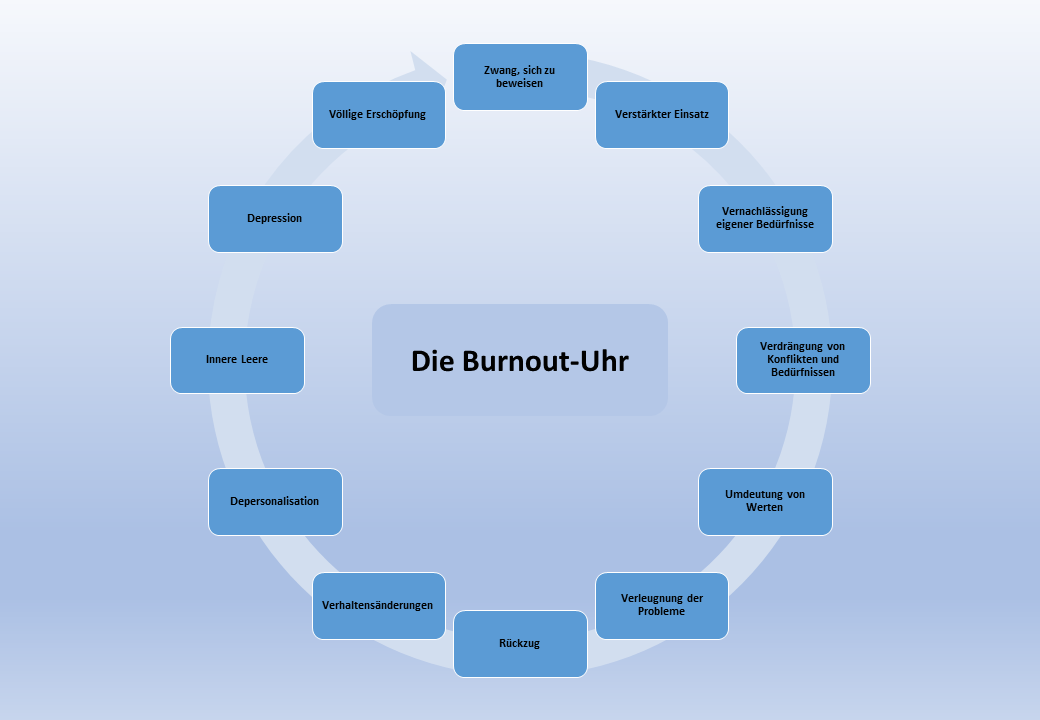The Burnout Syndrome
Feeling exhausted every day? Learn about burnout symptoms and how to prevent this condition.
The Burnout Syndrome
We've all probably experienced this: a busy, stressful week ends, leaving us drained and powerless. Our energy is depleted, and we just look forward to sleeping in and relaxing. Finally, two days off to recharge.
But what if this exhaustion and lack of energy persist for weeks? These could be signs of what's known as burnout syndrome.
Definition
The word "burnout" comes from English, meaning "to be burned out." The term was first introduced by German-American psychologist Herbert J. Freudenberger, who published a scientific article on it in 1974.
Burnout is now a recognized illness. It describes a severe form of exhaustion on mental, emotional, and physical levels.
Causes
The cause of the illness consists of two aspects:
-
Personality (internal cause)
- low self-esteem
- excessive ambition
- difficulty saying "no"
- fear of job loss
- perfectionism (unrealistic goals)
- need to meet others' expectations
-
External circumstances (external cause)
- open conflicts with colleagues and/or superiors
- lack of support in social circles
- lack of appreciation (professionally and/or personally)
- bureaucratic obstacles
- job stress (overload)
- stress in personal life
- bullying
- death of loved ones (deep grief causes a "feeling of helplessness")
- too many problems in personal and professional life
Symptoms
Deep exhaustion is the main feature of burnout. Other symptoms include:
- fatigue
- lack of motivation
- restlessness
- sleep disturbances
- loss of appetite
- concentration difficulties
- memory problems
- indifference
- energy shortage
- despair
- isolation
- psychosomatic complaints such as:
- headaches
- back pain
- limb pain
- lack of sexual desire
- nightmares
- stomach and intestinal issues
- high blood pressure
- chest tightness
- increased substance use (nicotine, alcohol, drugs)
- significant weight loss or gain
The symptoms are diverse and can vary in occurrence and intensity for each person with burnout.
Burnout Clock
Burnout can be treated early if everyone pays attention to their own and others' stress levels. The twelve stages of the burnout clock help respond to symptoms in time.

- Compulsion to prove oneself
- Ambition and perfectionism exceed manageable levels
- Increased effort
- Need to do all tasks oneself
- Neglect of personal needs
- Stress and overwork are seen as normal
- Suppression of conflicts and needs
- Lack of awareness of conflicts and minor errors in routine work increase
- Reinterpretation of values
- Important personal values and people are neglected
- Denial of problems
- Communication becomes aggressive and cynical, performance declines, and physical complaints increase
- Withdrawal
- Decreased ability to handle criticism, family and friends become annoying
- Behavioral changes
- Apathy, impatience, reduced resilience
- Depersonalization
- Loss of "self," neglect of health and well-being
- Inner emptiness
- Feelings of futility and uselessness, possible development of phobias and panic attacks
- Depression
- Deep despair and self-hatred, risk of suicidal thoughts
- Complete exhaustion
- Physical, mental, and emotional breakdown
Treatment
The earlier burnout is recognized, the better the chances of recovery. Therapy involves several elements. The most important is psychotherapy. Additionally, medication prescribed by a specialist (antidepressants) can help. Group and sports therapies can also be beneficial. Conversations with peers, such as in a support group, increase recovery chances.
Admitting the problem is crucial for therapy. Without recognizing burnout, any therapy will fail, and the risk of falling into depression is high.
Prevention
Burnout is a gradual process, often recognized too late.
Various methods can help prevent it:
- schedule and stick to regular rest periods
- maintain social contacts
- incorporate regular exercise into daily life
- talk with friends/family about current problems and fears
- keep a stress diary
- stress management
- relaxation techniques (yoga/autogenic training)
- clearly define life goals
- allow yourself to make mistakes
- self-acceptance
- boost self-esteem
For our mental and physical well-being, it's important to pay attention to our needs and body signals. Amidst work and daily stress, we should ensure we take enough breaks to rest.
